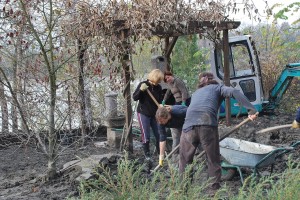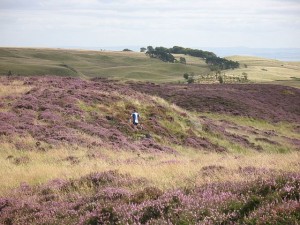Quite often, teenagers join the DofE programme with the simple intention of developing a few new skills, and perhaps going on a fun expedition with their friends. But the fact of the matter is that the programme has a far more significant impact on participants’ lives than they initially realise. As they continue on their journey, completing one activity after the next, they usually become more aware of just how beneficial their involvement can be, particularly when they begin to go for university interviews, and apply for places on academic courses.
A few years ago, the DofE commissioned Northampton University to carry out research into the impact of this programme on young people. The results of this research indicated that participation in the DofE has a tremendously positive effect on teens. Over 74% of the respondents said that their self-esteem had improved during their  time with the DofE, whilst 82% said that the volunteering activities they had undertaken had inspired them to do other volunteer work in the future.
time with the DofE, whilst 82% said that the volunteering activities they had undertaken had inspired them to do other volunteer work in the future.
Being familiar with this programme, Tunde Folawiyo is probably aware that the self-esteem which participants develop by planning activities, collaborating with others, and accomplishing their goals, is of enormous help when the time comes to apply to universities. The interview process for the UK’s top educational institutes can be very challenging, especially for teens who are perhaps shy or insecure. However, for DofE participants, who are confident and believe in their own self-worth, the experience will probably be far less intimidating.
One DofE member, who was completing her gold level activities at the time of answering the survey, said that as part of her leadership work, she had been asked to do a 20-minute presentation. She explained that, prior to joining the DofE, the thought of speaking to a large group of people for this length of time would have terrified her, but that, due to the confidence she had gained through her participation in the programme, she was able to deliver the presentation in a professional manner, without allowing her nerves to interfere with her performance.
The volunteer work which young people must do as part of the DofE can also help them get into their chosen academic institute, as this type of an extracurricular activity is something which is looked upon favourably by universities. Nowadays, most people, including Tunde Folawiyo, realise that these institutes want more than just good grades; they want to see that a student is well-rounded, and capable of doing more than merely learning off lists of facts and figures. A history of volunteer work indicates that the applicant has a sense of social responsibility, can take the initiative, and is able motivate themselves.



![By siegertmarc (St James Palace Uploaded by MaybeMaybeMaybe) [CC-BY-2.0 (http://creativecommons.org/licenses/by/2.0)], via Wikimedia Commons Tunde Folawiyo](http://upload.wikimedia.org/wikipedia/commons/thumb/4/49/St_James_Palace_%286017571180%29.jpg/512px-St_James_Palace_%286017571180%29.jpg) Ellen had an equally positive experience, stating that her volunteer work with a charity shop had been hugely rewarding, and that she had made many new friends as a result of her involvement with the DofE. Whilst she admitted that at times, it had been challenging, she said that in the end, it had been worth it. Both Harry and Ellen will be receiving their official certificates at a ceremony in St James’ Palace this month.
Ellen had an equally positive experience, stating that her volunteer work with a charity shop had been hugely rewarding, and that she had made many new friends as a result of her involvement with the DofE. Whilst she admitted that at times, it had been challenging, she said that in the end, it had been worth it. Both Harry and Ellen will be receiving their official certificates at a ceremony in St James’ Palace this month.![By zoonabar (Flickr) [CC-BY-2.0 (http://creativecommons.org/licenses/by/2.0)], via Wikimedia Commons Lawrence Dallaglio 2006](http://upload.wikimedia.org/wikipedia/commons/thumb/2/2e/Lawrence_Dallaglio_2006.jpg/512px-Lawrence_Dallaglio_2006.jpg) aglio – the former rugby star who launched the foundation – to help teens to get involved with the DofE, via their local rugby associations.
aglio – the former rugby star who launched the foundation – to help teens to get involved with the DofE, via their local rugby associations.![By The DofE (Own work) [Public domain], via Wikimedia Commons Tunde Folawiyo](http://upload.wikimedia.org/wikipedia/commons/9/91/DofE-Logo-2008.gif) those involved in the Fellowship has been instrumental in the evolution of the DofE; as a result of their donations, it has become one of the most renowned youth development programmes in the world. Prior to the founding of the Duke of Edinburgh World Fellowship in the late eighties, the DofE relied almost entirely upon the somewhat sporadic donations provided by individuals living in the UK. The limitations of this small budget made it difficult for the DofE committee to expand its programme, and it was only when the World Fellowship was launched that the programme truly began to make waves internationally.
those involved in the Fellowship has been instrumental in the evolution of the DofE; as a result of their donations, it has become one of the most renowned youth development programmes in the world. Prior to the founding of the Duke of Edinburgh World Fellowship in the late eighties, the DofE relied almost entirely upon the somewhat sporadic donations provided by individuals living in the UK. The limitations of this small budget made it difficult for the DofE committee to expand its programme, and it was only when the World Fellowship was launched that the programme truly began to make waves internationally.